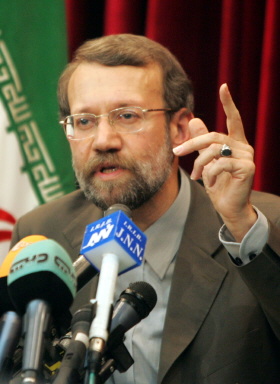Ahead of Moscow Talks, Iran Stresses Nuclear Rights

"The issue of enrichment to 20 percent or higher has been raised," he said.
Iran's parliament Speaker Ali Larijani stressed Wednesday that Tehran will not back down from its nuclear rights in talks with world powers.

Larijani announced that Tehran lawmakers were instructing Iran's negotiators
"they don't have the right to make concessions on Iran's rights under the NPT (nuclear Non-Proliferation Treaty)."
"Nevertheless, concerning the level of uranium enrichment, Iran can define it according to its needs and desires, but that cannot be a rule limiting Iran's nuclear activities," he said.
Iran's stockpile of 20-percent enriched uranium is the priority issue at the next round of talks due to take place next Monday and Tuesday in Moscow, following two rounds in Istanbul and Baghdad earlier this year.
Iran says it needs uranium enriched to 3.5 percent to fuel its sole nuclear energy plant in Bushehr, and 20 percent to produce medical isotopes in its Tehran research reactor.
Larijani made his comments during an appearance in parliament by Iran's chief negotiator and Supreme Leader Imam Khamenei's representative in the nuclear talks, Saeed Jalili.
Jalili reiterated Iran's official message to the so-called P5+1 group of powers it is negotiating with (U.N. Security Council permanent members the United States, Britain, France, Russia and China, plus non-permanent member Germany).
He insisted Iran's uranium enrichment was for peaceful purposes and highlighted the fact that Imam Khamenei had issued an edict banning all weapons of mass destruction.
He also said that "our enrichment is proportionate to our needs," and stressed that "the country's two enrichment plants, at Natanz and Fordo, were under the supervision of the International Atomic Energy Agency."
Jalili highlighted that "Western and US sanctions had failed to stop Iran progressing with its nuclear ambitions."
"Covert acts against Iran attributed to the West had not succeeded in thwarting Tehran from realizing its nuclear ambitions," he mentioned.
"All sorts of physical acts and even malware have failed," he said, apparently referring to the assassination of four nuclear scientists in recent years and the discovery of several computer viruses attacking Iran's nuclear networks.
Source: News Agencies, Edited by moqawama.org
Comments
- Related News

US Senate Votes 15-3 for Arming Syrian Opposition
12 years ago


